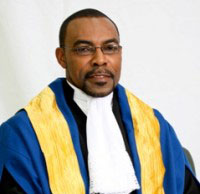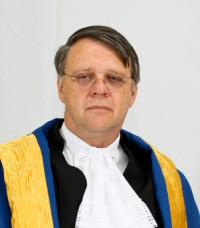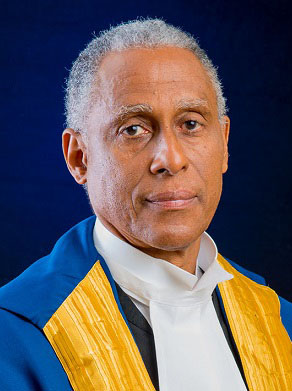By Femi Harris-Smith
While giving the government and the opposition more time to find common ground, the Caribbean Court of Justice (CCJ) yesterday set July 12th as the date when it will make orders based on its findings that the vote of no-confidence against the APNU+AFC administration was validly passed, thereby requiring elections, and that the Chairman of the Guyana Elections Commission (GECOM) was unlawfully appointed.
At a hearing, broadcast from the seat of the Court in Port of Spain, Trinidad, the judges heard from attorneys for the respective parties to the proceedings that no consensus had been reached since they handed down their ruling one week ago.
And while Senior Counsel Douglas Mendes, who represents opposition leader Bharrat Jagdeo, urged that the court give effect to Article 106 of the Constitution, which requires that general elections be held within three months of the passage of a no-confidence motion unless a two-thirds majority of the House agrees on an extension, Senior Counsel Stanley Marcus, who is representing GECOM, reported that the earliest a new voters’ list would be ready is Christmas Day. GECOM had previously indicated that the polls could be held in November, following a new national house-to-house registration, which had been due to begin this month.

At several points during the hearing, President of the Court, Justice Adrian Saunders expressed his exasperation with the dilatory manner in which Guyana’s leaders and their counsel have approached the matter of arriving at a consensual decision on the issues. “These matters are of the highest constitutional significance… It beats me that the Leader of the Opposition and the President and their respective counsel cannot meet to address the issues that confront us…,” he noted.
He added that he was not seeing the same type of urgency expected from the CCJ being reflected in the behaviour of the political directorate, which he called “unfortunate.”
Justice Saunders added that the court didn’t want to make political decisions but that the rule of law had to be upheld. At one point, he dramatically brandished the Guyana constitution and said that it had to be complied with.

The court has ruled last week that the December 21st motion of no-confidence against the David Granger-led administration was validly passed and also that the president’s unilateral appointment of retired judge James Patterson as Chairman of GECOM was unlawful.
Following the rulings handed down last Tuesday by the Trinidad-based court of last resort for Guyana, the court had expressed the hope that the two parties would have met and discussed what ought to be the way forward.
During the hearing yesterday, presided over by Justices Saunders, Winston Anderson and Jacob Wit, counsel for both sides indicated that this had not been done and that there was, therefore, still an impasse on the steps to be taken.
Mendes, who represents Jagdeo, urged the court to decide on the way forward in keeping with the provisions of Article 106, while stating that but for the legal proceedings which ensued, elections ought to have already been held since March 21st.
Article 106 (6) of the constitution states, “The Cabinet including the President shall resign if the Government is defeated by the vote of a majority of all the elected members of the National Assembly on a vote of confidence.”
Article 106 (7) adds, “Notwithstanding its defeat, the Government shall remain in office and shall hold an election within three months, or such longer period as the National Assembly shall by resolution supported by not less than two-thirds of the votes of all the elected members of the National Assembly determine, and shall resign after the President takes the oath of office following the election.”
With the court finding in effect that there is no Chairman of GECOM, Justice Saunders asked Mendes whether it would be possible for elections to be held within three months without the post being filled. Mendes answered in the affirmative.
‘Credible elections’
Marcus for GECOM argued, however, that in order to ensure the delivery of credible and fair elections, house-to-house registration is of utmost importance since the current list of electors has expired and without which, thousands of persons now qualified to vote would be disenfranchised.
On this issue, Mendes contended that since the elections ought to have already been held by now, the voters’ list that expired on April 30th, after the elections should have already completed, should be used.
If this is not possible, he suggested that, that very list is now available “to be added to, and subtracted from” for persons who have since become qualified or who cease to be qualified. He stood to his position that that is the list to be used, and so there would be no need for house-to-house registration.
He said it is just a matter of using that list in accordance with Sections 7 (1) of the Elections Amendment Act to supplement the list with any additions that would have taken place since April 30th to the date of the elections and any deletions.
And in accordance with 106 (7) of the constitution, Mendes said elections ought now properly to be held no later than three months.
Asked about his client’s position as regards the way forward for appointment of a new Chairman of GECOM, Mendes said he believed that it could be done within a 10-day period at the most. He said that that the court, if it were minded, could set a timeframe.
On this point he offered that seven days can be given by which Jagdeo submits to President Granger a list of candidates not unacceptable to him (Granger) for the post, and that the president can in turn be given three days to make a selection.
Justice Anderson had sought to enquire from Mendes whether the court can stipulate that elections be held within the three-month timeframe, in the absence of hearing from GECOM whether it could deliver credible elections within that period.
To this, Mendes said he was not quite sure what was meant by credible elections—to which the judge responded, “Elections in which the people of Guyana have confidence that their will is accurately expressed.”
Mendes held to his position, however, that the constitution was clear that elections were to be held within three months unless that time was extended by two-thirds of the National Assembly, so that whatever the list or state of the Commission is immaterial, since the constitution itself sets out the timeframe for the holding of elections after a vote of no-confidence.
Indicating that GECOM had not had the opportunity of meeting with counsel for the Opposition Leader, nor had any discussions, Marcus was the first to request an extension of time, while arguing that there is need for credible elections in accordance with Article 162.
He said that there are also several Acts which provide for house-to-house registration. Justice Saunders at this point sought to point out to counsel that the Acts of Parliament to which he referred were all subsidiary to the constitutional provisions, which must always prevail whenever there are inconsistencies.
Marcus, however, made the argument that Article 106 (6) of the constitution was merely “directory” and not “compulsory.”
Asked by Justice Saunders whether there was a date by which GECOM could indicate elections would be held, Marcus said that the earliest a new list of electors would be ready is no later December 25th and that elections could be held anytime thereafter.
He said that he has been instructed that GECOM has more than 9,000 persons in the field engaged in the operations geared towards the holding of elections and has already spent some $724 million towards that end.
Noting this to be a very unique date, Justice Anderson jokingly asked whether it was the intent of the Commission to provide “a Merry Christmas to the electorate of Guyana.”
‘Negligent’
In no uncertain terms, however, Justice Saunders described the announcement as “disappointing,” even as he pointed to Mendes’ position that in accordance with the constitution, the elections ought rightly to have already been held since March.
As the CCJ had done on several previous occasions, Justice Wit again questioned whether it wasn’t the role of the GECOM to always be in a state of readiness for the holding of elections, given the possibility, such as the case before the court, of the need for snap elections.
Justice Anderson then asked if there was an earlier date that could be suggested by GECOM if all the preparatory efforts towards the holding of elections were intensified. To this, however, Marcus said that he has been instructed that Christmas Day would be the earliest by which preparatory works would be completed and elections could only be held thereafter.
Justice Wit sought to get from Marcus, also, what he meant by the explanation that Article 106 (6) was directory, and asked whether the constitution is not to be followed and for there to be certainty in the law.
On this point he reasoned with Marcus that his use of the terminology “directory” could mean, three, five or even 10 months, even as he asked the lawyer what that meant, stressing that there needed to be sort of certainty.
Interjecting at this point, Justice Saunders said that while he did not want to say that the GECOM was being “negligent,” it ought always to be in a state of readiness for circumstances such as the calling of early elections.
Against this background, he questioned whether it is that the country is to be in limbo and uncertainty beyond the constitutionally stipulated three-month period.
Marcus submitted, however, that the country would not be left in limbo, while arguing that in accordance with Article 106 (7), the government shall remain in office. He used this to counter the court’s argument that the country would not be without a governing structure, and that extensions could be granted by the National Assembly.
Since the passage of the motion last December, the opposition PPP/C has not been attending the National Assembly as Jagdeo has said that there was no need to so do since the government needed to call elections.
Justice Anderson asked Marcus whether the constitution should be given effect to and elections called within three months. Counsel, however, enquired whether the court was imposing when elections should be called.
Justice Sunders, however, interjected, pointing out that the court was not seeking to make any imposition. He made it clear that the court was not involved politics but rather its mandate is always to ensure that the constitution and rule of law are upheld.
Marcus suggested that a week be given for the parties to meet and discuss the way forward, while stating that if there were a rush to go forward without such consultations, there exists a risk of not having credible elections and that further litigation could be brought before the court thereafter.
Senior Counsel Eamon Courtenay, representing the state, endorsed Marcus’ calls for an extension of time, while stating that the issue to be determined by the court were serious constitutional ones. He also asked that legal submissions be laid over to the court by all the attorneys. He advanced that in the absence of this, and not allowing the right prerequisite steps to credible elections, there was a real risk of the will of political parties prevailing and not the rule of law. He further said that the need for a credible list of electors could not be trivialised.
Justice Saunders observed that while all the attorneys have repeatedly demonstrated an appreciation of the seriousness of the matters, “it beats me” that no meeting had been convened by the parties to reach consensus on the way forward.
The judge said that while there may be need for a new list of electors, it has to be balanced with the constitutional need for elections to be held by a specified time of 90 days.
In his brief address to the court, meanwhile, Attorney General Basil Williams said that it is within the sole ambit of the President to announce the date for elections and no one else, while adding that he could only do so after being advised by GECOM as to its readiness to hold credible elections.
The Attorney General agreed that there should be consensus between the President and Opposition Leader in the appointment of a new Chairman of GECOM, but opined that the 10-day period suggested by Mendes for this entire process “doesn’t make sense.”
He said that the process should be dispensed with expeditiously, but cannot be done in a mere 10 days.
Justice Saunders said that while it was never the intention of the court for yesterday’s hearing to have ended with multiple submissions being made thereafter, it would acquiesce to the request for additional time with the hope that the parties will all meet and have fruitful discussions and consensus on the way forward.
The court has granted the parties no later than July 1st by which to lay over their written legal submissions to the court.
The case will then be called again on July 12th, when Justice Saunders said the court will deliver its orders.
The matters heard and consolidated by the CCJ were filed by attorney Christopher Ram, who had argued that the motion against government had been validly passed and therefore elections became due; private citizen Compton Reid, who contended that APNU+AFC defector Charrandass Persaud ought to have been disqualified from voting as he was a Member of Parliament in violation of the constitution, because of his dual citizenship; and Opposition Leader Bharrat Jagdeo, who opposed government’s contention that 34 votes, and not 33 votes, were required on the motion.
The motion, sponsored by Jagdeo, was declared passed by Speaker of the National Assembly, Dr Barton Scotland following the vote in its favour by then APNU+AFC parliamentarian Persaud on the night of December 21st, tipping the scales in favour of the motion.





